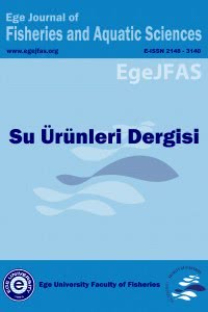Çamlık Lagünü (Karataş, Adana), seston, bentoz ve sedimentinde mevsimsel ağır metal değişimi
Adana, kıyı gölü, çökelti, mevsimsel değişimler, Türkiye, ağır metaller, su tabanı organizmaları, sucul topluluklar, plankton
Variations of heavy metal levels of seston benthos and sediment seasonally in çamlık lagoon (Karataş, Adana)
Adana, lagoons, sediment, seasonal variation, Turkey, heavy metals, benthos, aquatic communities, plankton,
___
Anonim, 1997. Türkiye Kıyılarındaki Lagünlerin Yönetim ve Geliştirilme Stratejileri ve Islahı. 1. Cilt.Tarım ve Köyişleri Bakanlığı Tarımsal Üretim ve Geliştirme Genel Müdürlüğü.578sAnonim, 2000. T.C Orman Bakanlığı Milli Parklar Ve Av -Yaban Hayatı Genel Müdürlüğü Adana Milli Parklar Ve Av -Yaban Hayatı Baş Mühendisliği s Çukurova Deltası.Adana.
Horowitz, A.J., Eldrıck, K.A., 1987. The Relation of Stream sediment Surface Area, Grain size and Composition of Trace Element Chemistry. Applied Geochemistry 2,437-452.
Millward, G.E., Rowley, C, Sands, T.K., Howland, R.J.M., Pantıulın, A., 1999. Metals in the Sediments and Mussels of the Chupa Estuary (White Sea) Russia. Estuarine, Coastal and Shelf Science. Vol. 48, pp. 13-25.
Moore, J.N., Brook, E.J., Johns, C, 1989. Grain Size Partitioning of Metals in Contaminated Coarse-Grained Floodplain Sediment, Clark Fork River, Montana. Environmental Geology and Water Research 14,107-115.
Osuna, P.F., Ochoa-lzaguırre, M.J., Bojorquez-Leyva, H., Michel-Reynoso, I.L., 2000. Macroalgae as Biomonitors of Heavy Metal Availability in Coastal Lagoons from the subtropical Pasific of Mexico.Bull. Environ.Contam.Toxicol. Vol.64, pp. 846-851.
Perkowska, A., Protasowicki, M., 1996. Heavy Metal Contents in Sediments and the Blue Mussel Mytilus edulis from Three Regions of the Southern Baltic Sea. Oceanological Studies No.4. Institute of Oceanography University of Gdansk.
Protasowicki, M., Morsy, G., 1993. Preliminary Studies on Heavy Metal , Contents in Aquatic Organisms from the Horsund Area, with Particular Reference to Arctic Charr (Salvelinus alpinus.l)- Acta Ichthyologica et Piscatoria. Vol XXIII.
Sunlu, U., Egemen, Ö., ÖNEN, M., 1996. Güllük Lagünü Girişinde Dağılım Gösteren Mamun(Upogeb/a pus///a)'da Bazı Ağır Metal Düzeylerinin Araştırılması. 11. International Symposium on Aquatic Products September 21-23, İstanbul-Türkiye.
Topçuoğlu, S., Güven, K.C., Kırbaşoğlu, Ç., Güngör, N., Ünlü, S., Yılmaz, Y.Z., 2001. Heavy Metals in Marine Algae from Şile in the Black Sea, 1994-1997. Environmental Contamination and Toxicology. Vol. 67, pp. 288-294.
Unep, (1984)Determination of total Cadmium, Zinc, Lead and Copper in Selected marine organisms by Flameless Atomic Absorption Spectrophotometry. Reference Methods for Marine Pollution Studies No. 11 Rev. 1
Vertacnik, A., Prohıc, E., Kozar, S., Juracıc, M., 1995. Behaviour of Some v Trace Elements in Alluvial Sediments, Zagerb water-Well Field Area, Croatia. Water Research 29,237-246.
Yaramaz, Ö., Mordoğan, H., Sunlu, U., Önen, M., 1992. A Coparative Study on Heavy Metal Concentrations (Zn, Cu, Pb, Cd, Ni, Cr)in the Sediments from Homa (İzmir-Turkey) and Karine(Aydın-Türkiye) Fisheries Lagoons. Rapp. Comm. Int. Medit, 33, pp.87.
Zauke, G.P., Clason, B., Savınov, V.M., Savinoma, T., 2OO3.Heavy Metals of Inshore Benthic Invertebrates from the Barent Sea. The Science of Total Environment. Volume 306, pp 99-110.
- ISSN: 1300-1590
- Yayın Aralığı: 4
- Başlangıç: 1984
- Yayıncı: Aynur Lök
Ahtopot (Octopus vulgaris Cuvier, 1797) yetiştiriciliği
Su ürünlerindeki omega-3 yağ asitlerinin önemi ve sağlık üzerine etkisi
HURİYE ARIMAN KARABULUT, İLHAN YANDI
Çanakkale Bölgesinde germeli tuzaklar (Fyke-Net) üzerine bir ön çalışma
ADNAN AYAZ, UĞUR ALTINAĞAÇ, ÖZGÜR CENGİZ
Muğla ilinde kültür balıkçılığı ve sorunları
Antalya ili balıkçılığının turizm ile etkileşimi
Cenkmen R. BEĞBURS, TURHAN KEBAPÇIOĞLU
Pelajik balık avcılığında teknik ve ekonomik açıdan pratik ve etkin bir av aracının geliştirilmesi
Dilek İşgören EMİROĞLU, AYTAÇ ÖZGÜL, Cezmi KANÇOBAN
Dem Limanında (Çandarlı Körfezi, Ege Denizi) fitoplankton populasyon dinamiği üzerine araştırmalar
